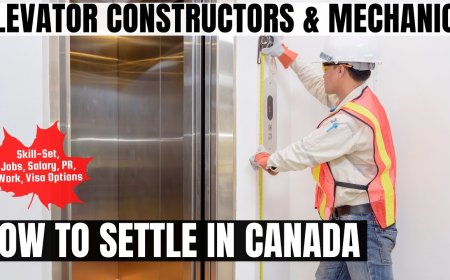Construction millwrights and industrial mechanics Migration to Canada: A Detailed Guide on Salaries, Professional Responsibilities, and Preferred Locations
Welcome to the pathway to Canada immigration for skilled professionals and trade workers. This guide is specifically tailored for Construction millwrights and industrial mechanics looking to work and settle in Canada, offering a deep dive into the essential aspects of immigration and employment in this field.
Introduction
Canada is known for its strong economy and diverse job opportunities, making it an attractive destination for individuals looking to build a successful career. In this article, we will be focusing on the career and immigration prospects for Construction millwrights and industrial mechanics in Canada. We will cover key aspects such as the job profile, main duties, education and licence requirements, necessary skills, median age and retirements, salary details, as well as possible visa options for individuals looking to pursue a career in this field. By the end of this article, readers will have a comprehensive understanding of the opportunities available to Construction millwrights and industrial mechanics in Canada.
What is the Profile Description of a Construction millwrights and industrial mechanics as per the Canadian National Occupation Classification (NOC) Standards?
Construction millwrights and industrial mechanics are skilled professionals who are responsible for the installation, maintenance, troubleshooting, overhaul, and repair of stationary industrial machinery and mechanical equipment. This includes industrial textile machinery mechanics and repairers. Construction millwrights typically work for millwrighting contractors, while industrial mechanics can be found in manufacturing plants, utilities, and other industrial establishments. Their expertise and knowledge are crucial in ensuring that machinery operates efficiently and safely in various industrial settings.
What are the Main Job Duties of a Construction millwrights and industrial mechanics in Canada?
- Read blueprints, diagrams, and schematic drawings to determine work procedures and layout plans for installation, repair, and maintenance of industrial machinery and equipment.
- Install, align, dismantle, and move stationary machinery using hand and power tools, hoisting, and lifting devices such as cranes and jacks.
- Inspect and troubleshoot machinery and equipment to detect irregularities and malfunctions, adjusting, repairing, or replacing defective parts as needed.
- Operate machine tools and welding equipment to fabricate parts, assemble machinery, and perform routine maintenance work on power transmission, hydraulic, and pneumatic systems.
- Construct foundations for machinery and equipment, directing other workers as needed, and clean, lubricate, and maintain machinery to ensure optimal functioning.
What are the Education, Certifications, and Licensing Requirements to Work as Construction millwrights and industrial mechanics in Canada?
To work as a Construction Millwrights and Industrial Mechanics, a high school diploma and completion of training courses or a vocational program are typically required. Additionally, individuals must complete a three- to four-year apprenticeship program or have a combination of over five years of work experience and industry courses in industrial machinery repair or millwrighting to be eligible for trade certification. Those who are hired from other industries may need further training in textile processes and experience as a textile manufacturing machinery operator. Trade certification as an Industrial Mechanic (Millwright) is available in all provinces and territories, while Construction Millwright trade certification is voluntary in Quebec and Ontario. Additionally, Industrial Sewing Machine Mechanic trade certification is available but voluntary in Quebec. Qualified industrial mechanics or millwrights can also obtain a Red Seal endorsement by successfully completing the interprovincial Red Seal examination.
What Essential Skills are Required for Construction millwrights and industrial mechanics to succeed in Canada?
To be successful in the profession of Construction millwrights and industrial mechanics, essential skills include the ability to detect and troubleshoot irregularities and malfunctions in machinery, construct foundations for machinery, repair or replace defective parts, fabricate parts required for maintenance, perform routine maintenance on machinery, operate machining tools, program programmable logic controllers, operate hoisting and lifting equipment, install machinery and equipment, and assemble machinery and equipment prior to installation. These professionals must have a strong understanding of machinery and equipment, as well as the practical skills to effectively maintain and repair them. Additionally, they must be able to work efficiently and accurately to ensure the safe and effective operation of industrial machinery.
What is the Median Age and Retirement Age for Construction millwrights and industrial mechanics in Canada?
The median age of skilled professionals working as Construction millwrights and industrial mechanics is 44 years old, while the average retirement age is 62 years old. This indicates that individuals in this profession tend to work for a considerable amount of time before retiring. With a retirement age 18 years older than the median age, it is clear that many professionals in this field are dedicated to their work and continue to contribute their skills and expertise to the industry for many years. This trend suggests a strong work ethic and a commitment to excellence within the Construction millwrights and industrial mechanics profession.
How many job openings exist for Other Construction millwrights and industrial mechanics in Canada, and what's their provincial distribution?
Construction millwrights and industrial mechanics are in high demand in Canada with a total of 542 job openings nationwide. The province with the highest number of job openings is Quebec with 307 positions available, followed by Ontario with 132 job openings. British Columbia has 36 job opportunities, Saskatchewan has 19, and Manitoba has 13 job openings for this profile. Nova Scotia has 12 job openings, while Alberta has 8, and New Brunswick has 7 job opportunities. Newfoundland and Labrador has 3 job openings, and Prince Edward Island has 2 positions available. Overall, Quebec has the highest number of job openings for construction millwrights and industrial mechanics, while Prince Edward Island has the lowest. This data indicates a strong demand for skilled workers in this field across various provinces in Canada.
What is the hourly wage or salary of Construction millwrights and industrial mechanics in different Provinces of Canada?
When it comes to the wages of construction millwrights and industrial mechanics in Canada, there is a significant variation across provinces. In British Columbia, the wages range from a low of $21.62 to a high of $44.88, with a median wage of $33.00. Alberta offers the highest wages for this profession, with a low of $23.00, a median of $40.00, and a high of $57.00. Saskatchewan follows closely behind, with wages ranging from $20.00 to $50.91, and a median wage of $38.38. Moving to the eastern provinces, Ontario offers wages ranging from $19.00 to $41.00, with a median wage of $30.00. Quebec has slightly lower wages, with a range from $19.83 to $38.25, and a median wage of $27.00. In the Maritimes, wages are generally lower, with Nova Scotia offering wages from $14.50 to $35.00, and a median wage of $26.00. Overall, construction millwrights and industrial mechanics in Newfoundland and Labrador have the highest wages in the eastern provinces, with wages ranging from $18.21 to $47.00, and a median wage of $35.00. Prince Edward Island has the lowest wages, with a range from $15.00 to $28.50, and a median wage of $23.00. In conclusion, wages for construction millwrights and industrial mechanics vary significantly across provinces in Canada, with Alberta offering the highest wages and Prince Edward Island offering the lowest. It is important for individuals in this profession to consider these wage differences when seeking employment opportunities in different regions of the country.
What are the various visa options available for Construction millwrights and industrial mechanics migrating to Canada?
Construction millwrights and industrial mechanics are currently in high demand in Canada, making them eligible for Category based Express Entry Invitation draws for Canadian PR under the Trade Occupations Category. The Express Entry Visa Category is a point-based system that assesses candidates based on factors such as age, education, work experience, and language proficiency. Additionally, Construction millwrights and industrial mechanics can also explore Provincial Nominee Programs and Employer Sponsored Work Visas for potential immigration opportunities. Other visa options may also be available for this profile. To learn more about the migration options and discuss your eligibility, book an appointment with our professionals today.
Have Questions or Need Assistance?
If you have any queries or require assistance with your immigration plans, we're here to help. Our experienced immigration consultants are ready to provide personalized guidance tailored to your specific needs.
Don't hesitate to reach out and schedule an appointment today. Whether you're seeking clarification on immigration processes, exploring visa options, or need support with documentation, we're dedicated to assisting you every step of the way.
Book an appointment with our team to discuss your immigration goals and receive expert guidance for your journey to Canada.
What's Your Reaction?
 Like
0
Like
0
 Dislike
0
Dislike
0
 Love
0
Love
0
 Funny
0
Funny
0
 Angry
0
Angry
0
 Sad
0
Sad
0
 Wow
0
Wow
0





































































